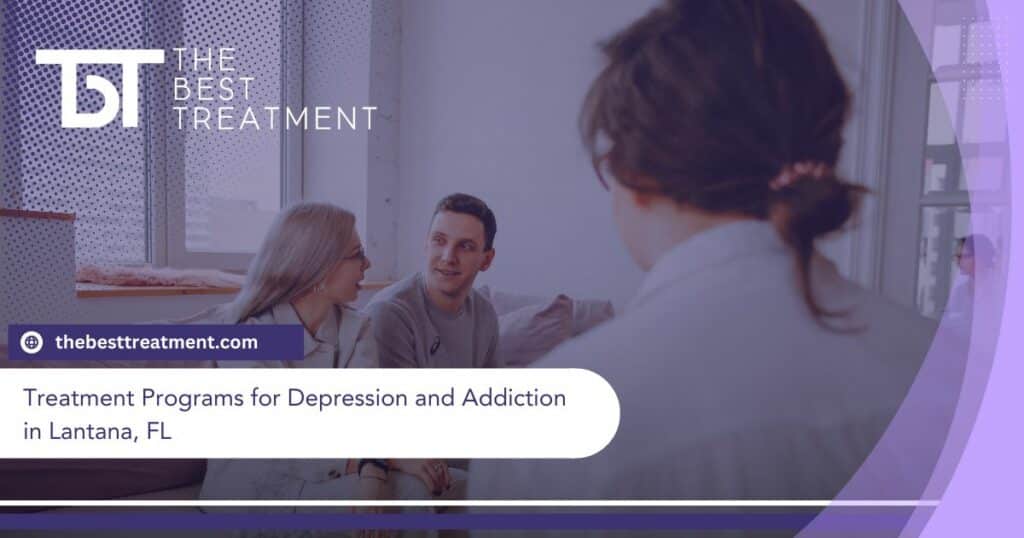Table of Contents
Methamphetamine addiction and dependence are serious conditions with devastating effects on physical and mental health. If someone struggles with meth addiction, the first step in getting professional help is often at a detox center. At a meth detox center, the body rids itself of a drug while symptoms of withdrawal are managed.
In this article, you will learn:
- What causes meth withdrawal
- Symptoms of meth withdrawal
- What to expect at a medical detox program
- How to choose a detox center
If you or a loved one are struggling with meth addiction, please reach out to The Best Treatment to learn how our detox and treatment programs in Lantana, Florida can help.
Understanding Methamphetamine: Effects and Addiction
Methamphetamine is commonly known as just meth, and it’s a very addictive, powerful stimulant that affects the central nervous system. Methamphetamine is usually found as a white, odorless and bitter-tasting crystal powder that’s snorted, ingested, smoked or injected. Street names for meth include crystal, ice and crank.[1]
When a person uses meth, it increases dopamine levels in the brain. Dopamine is a natural chemical involved in motivation, movement of the body and the reinforcement of rewarding behaviors. The increased dopamine release leads to euphoria, or that rush that users experience with meth, and that’s one of the key reasons the drug is so addictive.[2]
Harmful effects of meth on the brain and body include:
- In the short term, users can experience increased wakefulness and physical activity, decreased appetite, and a rapid heart rate. Some people will also experience increased blood pressure, an irregular heartbeat and hyperthermia, which is increased body temperature.[1]
- Chronic meth use leads to severe dental issues, referred to as meth mouth, as well as skin sores and extreme weight loss.[3]
- There’s a higher risk of infectious diseases with meth because of risky behaviors and the sharing of needles.
- Long-term meth use affects the structures of the brain linked to emotion and memory, contributing to emotional instability, cognitive deficits and mental health disorders like anxiety, hallucinations, paranoia and violence.[3]
Meth addiction develops through a combination of psychological, neurobiological and social factors. The process usually includes the following stages:
- The initial use of meth can happen for different reasons, and the intense euphoric effects that someone experiences during the first use can lead to repeated use.
- Over time, the brain begins adjusting to increased dopamine levels caused by the use of meth, leading to tolerance. With tolerance, the user needs higher doses to achieve the same euphoric effects.
- As tolerance builds, users rely on meth for normal functioning. The absence of the drug can cause withdrawal symptoms like depression, fatigue, cravings and increased appetite. Without professional help, the symptoms make it hard to stop using meth.
- Addiction often goes along with dependence, and it’s characterized by drug-seeking behaviors that are compulsive and happen despite harmful consequences.
Causes and Symptoms of Meth Withdrawal
Meth withdrawal refers to the physical and psychological symptoms occurring when someone dependent on the drug stops using it abruptly or significantly cuts back. Withdrawal can be a natural part of the detox process, and it’s difficult because symptoms can be intense.
The reason withdrawal symptoms happen is because prolonged use leads to changes in the function and chemistry of the brain.
For example, over time, the brain starts relying on meth to keep up high levels of dopamine. When use is stopped, the brain experiences a dopamine deficit that can lead to withdrawal symptoms.
Chronic meth use can cause the brain to adapt to the drug’s constant presence, and the brain needs time to get used to functioning without the drug, which can lead to withdrawal symptoms as well.[4]
There’s also physical dependence, and stopping meth shocks the system causing physical symptoms while the body tries to regain a natural balance.
Meth withdrawal symptoms can be both physical and psychological, making for an uncomfortable detox process in many cases. These symptoms include:
- Fatigue and lethargy
- Increased appetite
- Depression
- Agitation and anxiety
- Intense cravings
- Cognitive impairment and brain fog
- Sleep disturbances
- Physical symptoms like headaches, muscle aches, sweating and tremors
The duration that a person will have meth withdrawal symptoms varies, usually lasting a few days to several weeks. The worst of the symptoms is generally within the first week after stopping the drug, and some lingering symptoms can last longer.
What To Expect at a Meth Detox Center in Lantana
If you go to a meth detox center in Lantana or elsewhere, it’s a specialized facility to help you go through withdrawal safely under medical supervision. The environment is structured and supportive for patients to begin their recovery journey.
The main goal of a meth detox center is to help patients stay physically and psychologically safe as their bodies clear the drug from their systems.
The following are things to expect at a meth detox center:
Initial Assessment
When a patient arrives at a meth detox center, they’ll go through an in-depth assessment which typically includes a medical evaluation, psychiatric assessment, substance use history, and personal and social history.
Detoxification Process
The detoxification process is managed carefully to ensure the patient is safe and comfortable. Key components include continuous monitoring from healthcare professionals to manage withdrawal symptoms and address complications that could arise.
Medications are sometimes prescribed to alleviate withdrawal symptoms, stabilize mood and reduce cravings.
Proper hydration and balanced nutrition are necessary during detox to support the body’s healing process.
There may be some therapeutic support as well, although the primary focus during detox is physical withdrawal.
Aftercare Planning
A comprehensive aftercare plan is needed for long-term success because detox is only the first step of a recovery journey.
An aftercare plan could include recommendations for ongoing treatment, like inpatient rehab or outpatient programs, to address the underlying causes of addiction and to support sustained recovery.
Choosing a Meth Detox Center in Lantana
The decision to choose a meth detox center is a courageous decision and a major step toward overcoming meth addiction. A meth detox center offers a comprehensive approach to the detoxification process with medical supervision to manage withdrawal symptoms.
Understanding the process, from the initial assessment and detox to therapeutic support and aftercare planning, will help you better prepare for the challenges.
A meth detox center is a safe and structured environment allowing you to focus on healing with the ultimate goal of achieving long-term sobriety.
References:
- National Institute on Drug Abuse (NIDA): Methamphetamine Research Report
- The Journal of Neuroscience: Loss of Dopamine Transporters in Methamphetamine Abusers Recovers with Protracted Abstinence
- NIDA: What are the long-term effects of methamphetamine misuse?
- Wiley Online Library: The nature, time course and severity of methamphetamine withdrawal
Medically Reviewed: September 25, 2019

All of the information on this page has been reviewed and verified by a certified addiction professional.










